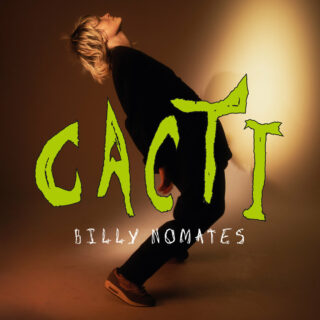Billy Nomates
Cacti
(Invada)
7/10

(Invada)
7/10
Read our in-depth interview on the new album with Billy Nomates in our Members Lounge (subscribe here for access)
On her debut record as Billy Nomates, Tor Maries took aim at the world around her – at dead-end jobs, at consumerism, at societal expectations. Obvious targets for a punk-leaning indie rock record, yes. But her sharp spoken delivery and caustic, minimal instrumentals were convincing enough to make you feel it. There’s real frustration in her voice on tracks like ‘No’ and ‘Call In Sick’, emphasised by its shoestring DIY presentation (though having Geoff Barrow on production makes it a pretty fancy shoestring). Still, this was a record often more about the frustration lurking under the surface than the surface itself, and an inner melancholy hiding beneath her swagger.
Her follow-up album is a record about internal pressure rather than external ones. Cacti is finished with sarcasm and confidence. It’s a dark and reflective album that sits with despair rather than describing the potential reasons for it. The snide asides of the last record are traded for fuller, more thoughtful songwriting.
Early single ‘Blue Bones (deathwish)’ saves the starkness for its lyrics, where suicidal ideation is thrown around as a casual conversation topic (“If you wanna die then do it, you don’t need my permission”). The tune itself borders on jaunty, while melancholy, anger and grief all battle for the spotlight in her vocal. It’s a more mature and wiry approach, for an artist who began with such a direct and deadpan delivery. Opener ‘Balance is Gone’ is just as brutally honest as any of that early material. She dismisses meditation and healing rituals, but as poetic symbols that reflect her own crumbling self-actualisation, rather than something to scoff at over a drum machine.
Despite the weightier topics, Cacti is a more accessible record. Witty punchlines and icy verses are replaced by wistful melody lines and a grander instrumental presentation. It’s a pop album, which might disappoint those who came for the spoken word and the attitude. But the bright guitar lines and memorable refrains that colour the record often help to create a sense of dynamism.
Still, there are other moments where this more polished approach can flatten the appeal. With its overly cheeky chorus, ‘Spite’ reminds of any number of anti-love songs from the past 40 years, from Meredith Brooks to Paramore. ‘Spare Gun’ is an ’80s piano-rock throwback that doesn’t find a groove to sink into, and starts to sound a bit Hall and Oates as the layers are added.
The jarring major-minor shift on the chorus of ‘Vertigo’ encapsulates the slight identity crisis on the record, as woozy guitar and bass rub awkwardly against bombastic multi-tracked vocals. While the song is going for queasiness, it sounds more unsure than the sour notes of the first record. These slight missteps are bound to happen when aiming as high as Billy Nomates. Her songwriting style has morphed and evolved in a short period, and these experiments with form are clearly in the service of searching for a great song.
She finds that on tracks like ‘Apathy is Wild’, which combine gut-punch lyricism with lilting songwriting to powerful effect. Here, Maries finds real power in sitting with the uncomfortable festering of apathy, and how it morphs into pure nihilism. That it’s composed so beautifully acts as the ideal contradiction to its message.
Closer ‘Blackout Signal’ is even bleaker, and offers no easy answers for crawling out of that despair. The churning bassline, far-off pianos and drum machines all feel detached from Maries, who sings at us directly, as she always does. “I have always known that I’ll meet you at the end / Just something in my bones, bittersweet bitter end”, she sings as a siren blares, buried in the noise. Though she doesn’t find peace anywhere on the record, there’s a weird comfort in wondering who the ‘you’ of the song could be.
Billy Nomates presented herself as a performer barely holding it together on her debut, but where she formerly implied that through cryptic clues and outward anger, her new record artfully explores her personal battles with a universal depth. It’s also a record that can be as confused and complicated as those feelings themselves and will be polarising as a result. There is still so much promise and heart in what she’s doing that many will go with her into this bold shift towards more traditional pop structures.